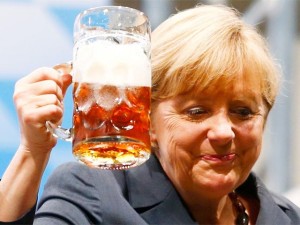By Peter Williamson
Staff Writer
It’s official, the Christian Democrat Union (CDU) has emerged as the big winner from this year’s general elections in Germany, and Angela Merkel will be Chancellor of Germany for a third term. The CDU managed to garner 41.5 percent of the vote, marking for them the first great victory since the Kohl-era of the 90’s. While Helmut Kohl, the former German Chancellor was voted into office as a result of gratitude for reuniting Germany, this election’s voters were grateful to Merkel for perceivably keeping the Eurozone – and above all, Germany – stable, despite the recession.
However, the Social Democrat Party (SPD) also managed to get more votes than in the previous elections, with 25.7% as opposed to 2009’s 23.0%. The SPD is the CDU’s traditional rival, and voters usually split between the two of them. However, in recent years the SPD has taken a hit, and only now seems to be recovering.
Another interesting, yet not surprising, result of the federal elections was the decline in support for the Free Democratic Party’s (FDP) to a mere 4.8%. This is a devastating blow to the party due to the fact that under German law, parties with less than 5% do not get parliamentary representation. The FDP was previously in a coalition with the CDU. The CDU itself is 5 seats shy of being able to govern with an absolute majority, meaning that they need a coalition partner, the most likely of which being the SPD. This is because SPD (“The Left”), who came third this time instead of the CDU’s usual coalition-partner, the FDP, is antithetical to the CDU’s central tenets. In this case, the SPD would be the lesser of the two evils for them.
This election was also quite meaningful and much followed at the European level, as Mrs. Merkel has established herself as the face of Europe, especially during this crisis. Some love her, some hate her, and many just wanted to know how she will influence Germany, and through her presence, the rest of Europe, in the future.
Known as the ‘Second Iron Lady’, some believe that her leadership protected the Eurozone from slipping deeper into crisis, whereas others think that another term will further divide it, due to her perceived draconic economic measures concerning other countries. For now, it will be interesting to see how a possible CDU-SPD coalition will impact the German and European political and economic landscape.
Peter Williamson, class of 2015, is a Politics and Sociology major from Hamburg, Germany.
